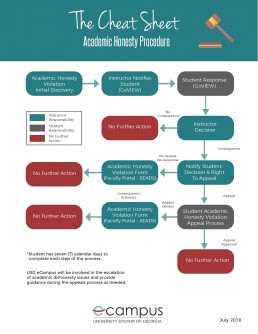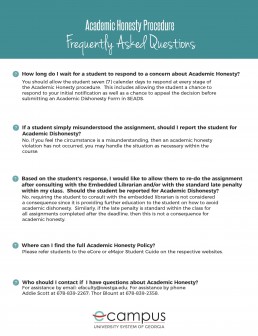Academic Honesty Quick Guide
Confirmed academic honesty violation cases must be reported by the instructor to the student’s home institution using the Academic Honesty Violation Form located in the Faculty Portal (SEADS).
https://seads.ecampus.usg.edu/Account/Login.aspx
Academic Honesty Procedures
A student who is contacted by an instructor regarding an academic honesty violation should provide all information requested so that a thorough investigation can take place. Grades and/or academic records may be affected if academic dishonesty is confirmed. Confirmed Academic Honesty Violations must be reported to the student’s home institution. A student has a right to an appeals process if he or she feels any grade or decision is unfair; they may consult with the affiliate eMajor liaisons or eCampus Support Services as necessary. Also, after the initial discovery of academic dishonesty by the instructor, the student will be afforded the following:
- Student is made aware by instructor regarding concern of an academic honesty violation.
- Student is provided with possible consequences of the offense.
- Student is provided with the opportunity to discuss or explain the circumstances in writing.
- Student responds to the concern(s) from #1 above within seven (7) calendar days. Response is sent to the instructor via the mail tool inside the course.
- Student receives decision from the instructor.
- Student accepts or appeals the instructor’s decision within seven (7) calendar days.
- If the student decides to appeal the instructor’s decision, the student must submit an Academic Honesty Violation Appeal Form and then take the following steps:
- Appeal in writing to the Executive Director of eMajor Academics.
- If the appeal is not resolved at the Executive Director of eMajor Academics level, the student must inform Executive Director of eMajor Academics, in writing, within seven (7) calendar days that he/she is not satisfied.
- The student must then submit a written appeal to an ad hoc committee of eMajor faculty. The Executive Director of eMajor Academics will appoint the committee, which will then consider the written appeal from the Executive Director’s decision via conference call or through an electronic medium. After careful deliberation and consideration, the committee will recommend to the student’s home institution dean what should be done in the case.
- The dean of the program at the student’s home institution will render the final decision, taking all relevant factors into consideration.
The full Academic Honesty definition and policy can be found on the eMajor website at: https://emajor.usg.edu/current-students/student-guide/policies-and-procedures#academic-honesty

